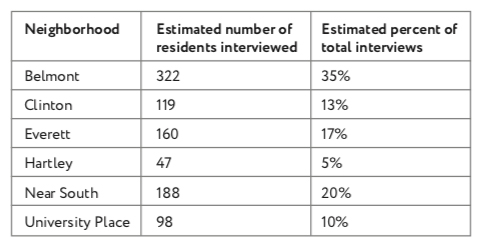WHAT IS COLLECTIVE IMPACT LINCOLN?
Collective Impact Lincoln is a partnership between Civic Nebraska, Nebraska Appleseed, and the South of Downtown Community Development Organization. We focus our work on Belmont, Clinton, Everett, Hartley, Near South, and University Place neighborhoods in Lincoln, Nebraska.
Our Mission
Collective Impact Lincoln supports lasting, meaningful, resident-led investment and positive change in Lincoln’s core neighborhoods. Through canvassing, community events, and Community Builder Workshops, we help neighbors examine their communities’ natural strengths and adopt new ways to improve.
Our Vision
We envision a Lincoln where:
- Diverse community members, especially those from underrepresented communities and neighborhoods, are equitably engaged in public decision-making.
- Public policy and practices reflect and respond to community needs.
- All community members have access to decent housing, quality jobs, and public support structures so they can thrive.
- Every neighborhood is seen as vibrant and vital to our greater community, and no neighborhood experiences extreme poverty.
Our Neighborhoods
Collective Impact Lincoln partners with neighborhoods identified through the Lincoln Vital Signs1 report as being high-poverty or highly mobile. Many of these neighborhoods are also highly diverse in race, ethnicity, or income level.


Collective Impact Lincoln interviewed more than 900 residents3 in the six neighborhoods about how to improve their communities. A majority of interviews were conducted in Belmont and Near South neighborhoods. About half of residents identified as female (55%) and male (44%), while 1% identified as non-binary or another gender identity.
1https://www.lincolnvitalsigns.org/
2The Census Bureau defines “below poverty” as below 100% of poverty level. Neighborhood demographics estimated using Census Tract data from the U.S. Census Bureau, American Community Survey, 2015-2019 5-year estimates, Tables S1701, DP05.
3A total of 962 surveys of at least 927 different individuals.